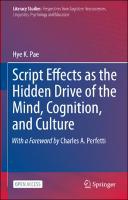Explore

Script Effects as the Hidden Drive of the Mind, Cognition, and Culture
Hye K. Pae
2020
0 Ungluers have
Faved this Work
Login to Fave
This open access volume reveals the hidden power of the script we read in and how it shapes and drives our minds, ways of thinking, and cultures. Expanding on the Linguistic Relativity Hypothesis (i.e., the idea that language affects the way we think), this volume proposes the “Script Relativity Hypothesis” (i.e., the idea that the script in which we read affects the way we think) by offering a unique perspective on the effect of script (alphabets, morphosyllabaries, or multi-scripts) on our attention, perception, and problem-solving. Once we become literate, fundamental changes occur in our brain circuitry to accommodate the new demand for resources. The powerful effects of literacy have been demonstrated by research on literate versus illiterate individuals, as well as cross-scriptal transfer, indicating that literate brain networks function differently, depending on the script being read. This book identifies the locus of differences between the Chinese, Japanese, and Koreans, and between the East and the West, as the neural underpinnings of literacy. To support the “Script Relativity Hypothesis”, it reviews a vast corpus of empirical studies, including anthropological accounts of human civilization, social psychology, cognitive psychology, neuropsychology, applied linguistics, second language studies, and cross-cultural communication. It also discusses the impact of reading from screens in the digital age, as well as the impact of bi-script or multi-script use, which is a growing trend around the globe. As a result, our minds, ways of thinking, and cultures are now growing closer together, not farther apart. ; Examines the origin, emergence, and co-evolution of written language, the human mind, and culture within the purview of script effects Investigates how the scripts we read over time shape our cognition, mind, and thought patterns Provides a new outlook on the four representative writing systems of the world Discusses the consequences of literacy for the functioning of the mind
This book is included in DOAB.
Why read this book? Have your say.
You must be logged in to comment.
Rights Information
Are you the author or publisher of this work? If so, you can claim it as yours by registering as an Unglue.it rights holder.Downloads
This work has been downloaded 96 times via unglue.it ebook links.
- 96 - pdf (CC BY) at OAPEN Library.
Keywords
- Cognitive linguistics
- cognitive studies
- Language
- Language Education
- Language teaching & learning
- Language teaching & learning (other than ELT)
- Linguistic relativity and reading
- Linguistics
- Literacy
- open access
- Psycholinguistics and Cognitive Lingusitics
- Psychological mechanisms of reading
- Script effects and critical contrastive rhetoric
- The emergence of written language
- thema EDItEUR::C Language and Linguistics::CF Linguistics
- thema EDItEUR::C Language and Linguistics::CF Linguistics::CFC Literacy
- thema EDItEUR::C Language and Linguistics::CJ Language teaching and learning
- Writing systems and literacy
Links
DOI: 10.1007/978-3-030-55152-0Editions

